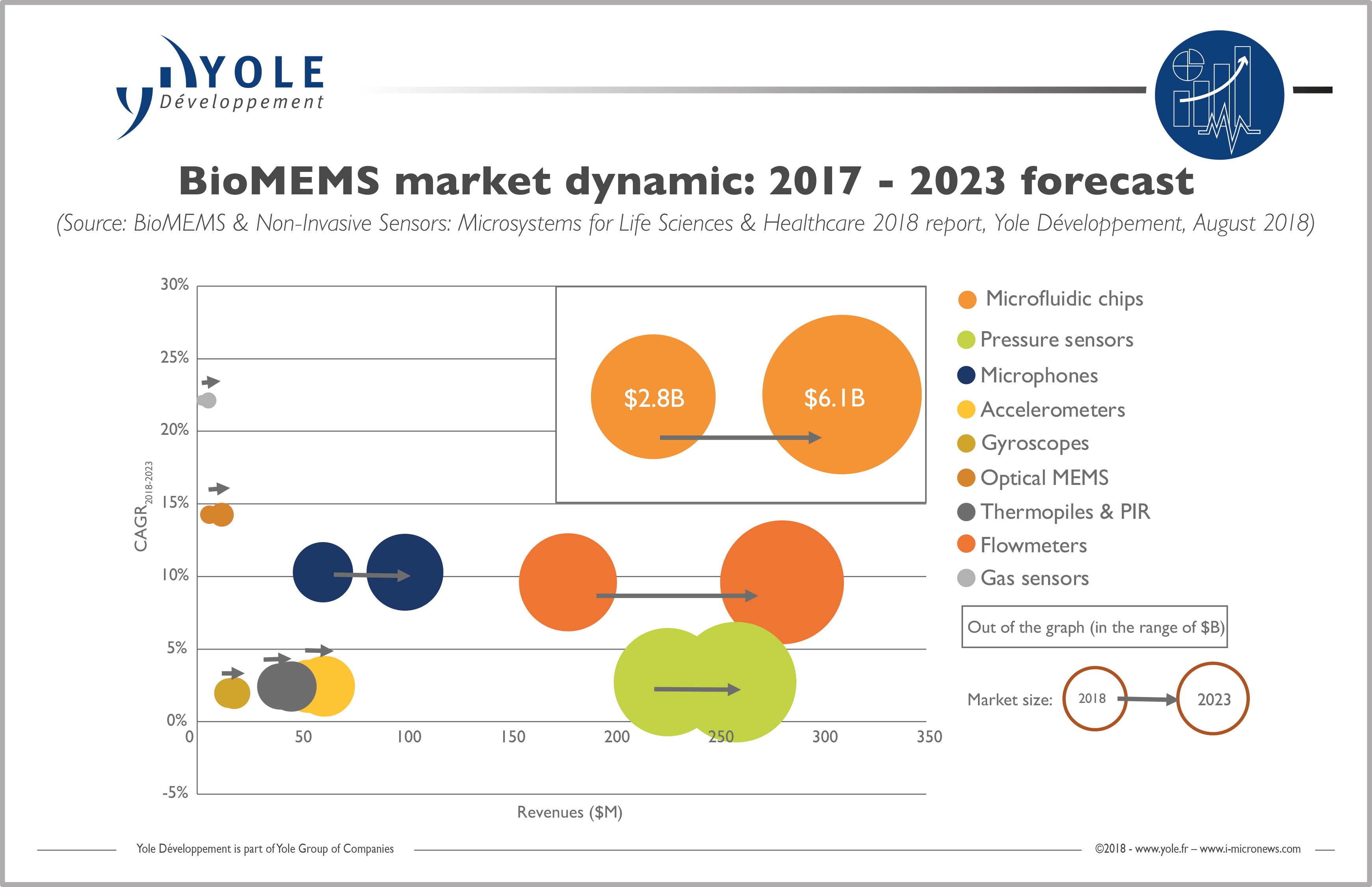Healthcare transformation: a business opportunity for bioMEMS

A new momentum from sensor makers responds to the challenge of global healthcare transformation. According to Jérôme Mouly, Senior Technology & Market Analyst at Yole Développement (Yole), these innovations open the door to new business opportunities for mobile healthcare and emerging non-invasive devices.
MEMS technology is playing a key role in this revolution. Indeed, technology is now mature enough to offer miniaturized and low power-consumption sensors, with a strong demand on sensor performances to reach the medical grade requirements at an acceptable price.
The market research and strategy consulting company Yole announces today its new life sciences and healthcare report: BioMEMS & Non-Invasive Sensors: Microsystems for Life Sciences & Healthcare 2018.
This new analysis identifies threats and opportunities related to bioMEMS with promising technologies and booming applications, along with market and technology trends. It proposes a valuable healthcare market segmentation dedicated to the MEMS devices. An overview of the main players at every level of the supply chain, including market shares is also well described. In addition, this 2018 edition reveals a relevant comparison of the BioMEMS market with the global MEMS market with similarities and differences. A detailed description of this report is available on i-micronews.com, MedTech reports section.
Yole's Life Sciences & Healthcare analysts offer you today an interesting snapshot of the MEMS industry for life sciences and healthcare applications.
"The MEMS technology is consolidating its healthcare market penetration," asserts Jérôme Mouly from Yole. "MEMS products will continue their huge 14.9% growth for the next five years."
More than ever, companies are showing a growing interest in the healthcare domain. In the past 2 - 3 years, major players like Google, Apple, and Amazon have highlighted challenging projects, i.e. measuring blood glucose via smartwatches or smart lenses. Accordingly sensor makers are developing new technologies and platforms to answer the specific requirements of medical grade products.
Therefore their aim is to avoid the strong constraint coming from implantable devices and related regulations. At the same time, it will bring comfort and ease of use for patients. This trend will so impact the bioMEMS non-invasive sensors market evolution in the coming years.
Demand for MEMS devices is increasing exponentially thanks to a democratization of medical devices that's bringing them closer to consumer and creating a high demand for portable and wearable devices enabling patient monitoring at the point of need. In order to satisfy demand, almost all MEMS foundries are proposing manufacturing services dedicated to healthcare applications.
With the addition of microfluidic chips including Si-based, polymer-based, and glass-based, the BioMEMS market, is expected to more than double. The consulting company announces a US$3 billion market in 2017. This figure should reach US$6.9 billion in 2023, showing a14.9% CAGR from 2017 to 2023. This makes bioMEMS capabilities a must-have for today's global sensor makers.
Under this dynamic ecosystem, what are the leading MEMS devices?
"Microfluidics demand still drives the BioMEMS market thanks to point of care applications and an increasing demand for next generation sequencing", announces Sébastien Clerc, Technology & Market Analyst from Yole.
Pressure sensors are more mature sensor devices used in respiratory and blood monitoring, still reaching volumes of several hundred million units per year. Nevertheless, these mature devices are expected to enjoy a new wave of interest thanks to fresh demand for smart connected objects like inhalers and sleep apnea monitoring systems.
It is also worth noting that the transformation of global healthcare is spurring strong efforts to acquire new functionalities and access to new diagnostic capabilities with micromachined ultra sound transducers including CMUT and PMUT, as well as gas sensors.
Moreover, MEMS sensor innovation has triggered developments in neurotechnologies, with neural implants for therapeutic applications (still at research level today) paving the way for better quality-of-life for patients with neurodegenerative diseases.
Yole's analysts will present a comprehensive overview of the biosensors for life sciences and healthcare applications at the Medical MEMS and Sensors 2018 conference (Nov. 7&8 - Santa Clara, CA, USA)

































